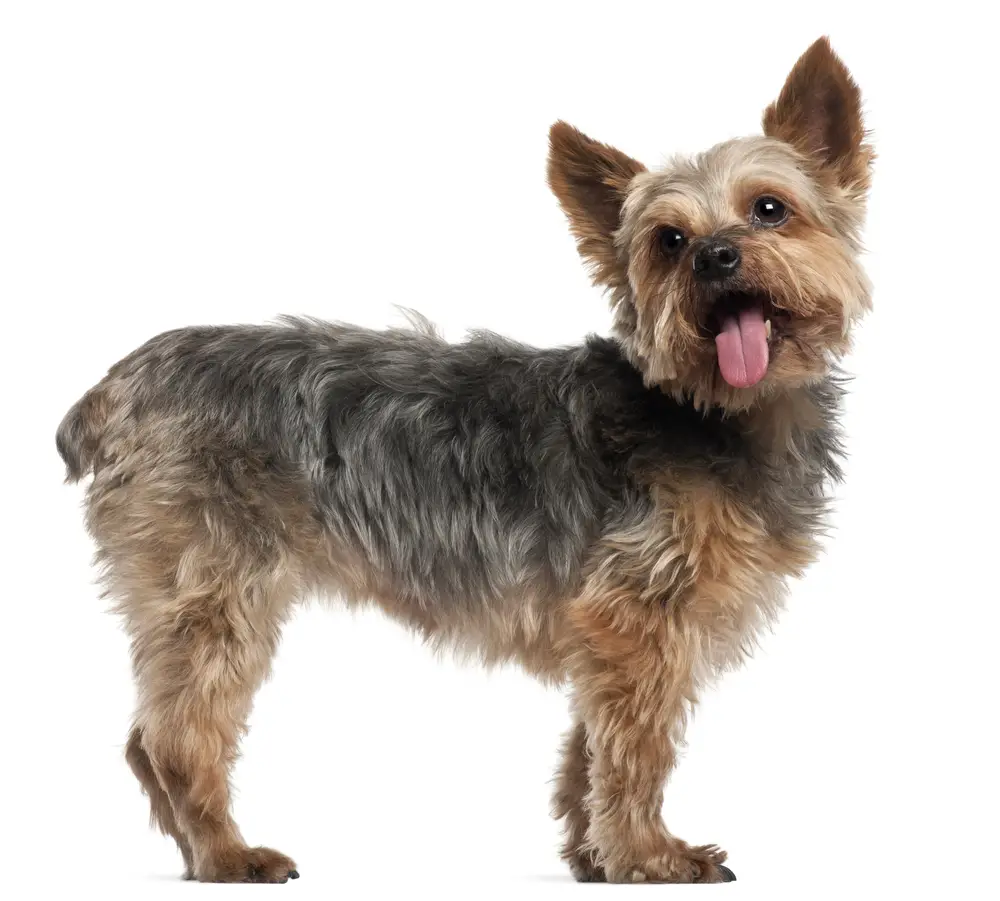Teacup Yorkies
Teacup Yorkies
Planning to bring home a Teacup Yorkie? Or have you just heard a lot about them and you’re curious about what makes an already small dog “teacup-sized?” Here’s everything you need to know about the Teacup or Micro Yorkie and how to meet their unique health needs.
What Is a Teacup Yorkie?
 Despite how it might sound, a Teacup Yorkshire Terrier is not its own separate breed of dog. The term “teacup” instead refers to any type of dog that’s small in size and below the breed standard.
Despite how it might sound, a Teacup Yorkshire Terrier is not its own separate breed of dog. The term “teacup” instead refers to any type of dog that’s small in size and below the breed standard.
The term “teacup” is not officially recognized by any professional dog organization. According to the American Kennel Club (AKC), an adult Yorkshire Terrier should weigh no less than 4 pounds or 1.81 kg.
So, how much does a Teacup Yorkie weigh? Teacup Yorkies are generally considered any adult Yorkie under 4 pounds, the breed standard.
This means a teacup Yorkshire Terrier will not be recognized in any official capacity.
Generally speaking, any dog that weighs 4 pounds or less when fully grown is considered to be teacup sized. What many people may not be aware of, however, is the considerable number of potential health risks associated with creating such tiny dogs.
In general, the term “teacup is used as a marketing ploy to attract potential buyers and persuade them into thinking they’re purchasing something more valuable and, of course, worthy of their higher price tag. An easy way to boost the price of Yorkshire Terrier puppies is advertising them as teacup Yorkie puppies — even if they don’t turn out smaller than the average Yorkie.
Before buying or adopting a teacup or mini Yorkie, you should know how they’re actually breed.
How Are Teacup Yorkies Created?
 The techniques breeders use to create dogs as tiny as teacup Yorkies come with a whole host of controversies. Many of the techniques used to create such small dogs with reliable success can be extremely harmful to a dog’s health and happiness.
The techniques breeders use to create dogs as tiny as teacup Yorkies come with a whole host of controversies. Many of the techniques used to create such small dogs with reliable success can be extremely harmful to a dog’s health and happiness.
Techniques such as inbreeding runts with other runts with the desire of creating an entire litter of miniscule dogs, or stunting the growth of the pups by not feeding them, are just two unscrupulous and unethical techniques breeders may use. In these examples, inbreeding can easily increase the risk of inheriting genetic disorders, and stunting the growth of puppies can lead to issues regarding their skeletal, digestive, and nervous systems.
Because Yorkshire Terriers are already prone to many health concerns, and smaller-than-average Yorkies have compounded health risks, these unethical practices can dramatically shorten the lifespan of the dogs. Because of this it’s important to do your due diligence on breeders if you do choose to go that route instead of rescuing.
It’s also not uncommon to find normal-sized smaller breeds of dog marketed as “teacup” in the hopes that an unknowing buyer may not be fully aware of a) what constitutes a teacup dog, and b), just how small those smaller breeds can really be in general. Teacup dogs can go for an extremely high price – often ranging anywhere between $750 and well over $3,000.
 Bearing all of this in mind, it is still possible to find an ethical breeder that has teacup Yorkies for sale. In many cases, an ethical breeder may have a litter with some smaller-than-average or miniature Yorkie pups that they can still give a health guarantee. Many litters produce at least one runt, no matter the nutrition of the mother and pups.
Bearing all of this in mind, it is still possible to find an ethical breeder that has teacup Yorkies for sale. In many cases, an ethical breeder may have a litter with some smaller-than-average or miniature Yorkie pups that they can still give a health guarantee. Many litters produce at least one runt, no matter the nutrition of the mother and pups.
It’s definitely not easy to find Teacup Yorkies in this way but it is possible and guarantees the best possible health and well-being for your Yorkie. Besides, you really don’t want to be helping a breeder that purposely hurts Yorkies and other animals.
Many pet stores are supplied by puppy mills, mass-producing puppy machines that have little to no regard for the happiness or health of their dogs. When looking for a Teacup Yorkie from an ethical seller, it would be best to avoid the pet stores.
Potential Health Problems Found with Teacup Yorkies
Standard Yorkshire Terriers, at around 4 to 8 pounds in weight, are already tiny, fragile, and in need of special care and attention. Teacup Yorkies, however, tend to range from half a pound as a pup to 2.5 to 4 pounds as an adult. This increases the risk of a whole host of health problems and risks ranging from fractures and spinal disorders to hypoglycemia.
The Yorkshire Terrier Club of America reports that Teacup Yorkies are very susceptible to a long list of hereditary and non-hereditary health issues. Many of these problems can go undetected for years.
Collapsed Trachea
A chronic and progressive disease affecting the cartilage in the trachea, tracheal collapse is believed to be a condition present from birth, and is a result of changes to the cartilage, causing it to weaken.
Noticeable signs of a collapsed trachea include labored breathing and a signature “honking” cough. Other factors such as obesity, pulmonary edema (a buildup of fluid in the lungs), respiratory infection, cardiomegaly (where an abnormal enlargement of the heart occurs), and allergic respiratory disease may exacerbate the symptoms of a collapsed trachea.
Yorkshire Terriers suffering from the condition will show signs of breathing difficulties while resting, which can often worsen when they’re feeling excited or distressed, when exercising, or even when out on a hot and humid day.
The best way to prevent a collapsed trachea or keep the condition from worsening is using a soft, no-pull dog harness on your Teacup Yorkie — not a collar. All Yorkies should be walked with a harness that won’t put pressure on the trachea and cause damage to the delicate structure.
Increased Risk of Fractures
For a dog as small as a Teacup Yorkie, the structure and strength of their bones will become smaller and weaker the smaller the Yorkie gets. When a dog weighs less than four pounds, they are at a high risk of fractures, especially from even short falls like from the couch. Ligaments and tendons will also be prone to injury, too.
If your Yorkie wants to join you on the couch, pick them up and place them next to you without letting them try to jump up themselves. Don’t leave a Teacup Yorkie somewhere like a sofa where they will try to jump off to follow you. When left to their own devices while you’re not available to supervise, it may be a good idea to keep your pup in a playpen like this IRIS playpen.
Hypoglycemia

Hypoglycemia is quite common in Yorkshire Terriers and other toy breeds. Due to their reduced amount of muscle mass when compared to larger dogs, their bodies are less able to store much glucose, and what reserves they do have tend to diminish rather quickly.
As you can imagine, making an already tiny Yorkie even smaller will only exacerbate this condition.
Yorkies can also experience a delay in teething, resulting in them being unable to chew most foods. This will result in the release of less sugar into the body. When combined with the lack of muscle mass, this can only worsen the risks of hypoglycemia.
Signs that your mini Yorkie may be hypoglycemic include:
- Lack of attention
- Lethargy
- Unfocused looking eyes
- Drooling
- Trembling
- Limping
- Seizures
- Pale or greyish sticky gums
- Drowsiness
- Weakness
- Shivering
- Fainting
Hypoglycemia can lead to seizures or even brain damage. It may cause lower body temperatures, a serious risk as a Teacup Yorkie is already at risk of hypothermia and can’t regulate his body temperature well. When left untreated, hypoglycemia can cause death.
The good news is hypoglycemia can be managed. You’ll need to monitor your Yorkie carefully and make sure their blood sugar stays high enough with regular meals and snacks. Don’t let your Yorkie go too long without eating. To keep their blood sugar high enough, add a nutritional supplement to their food and use it as a treat or snack between meals. NutriCal by Vetoquinol is a good choice.
Hip Dysplasia
The hip joint is comprised of two parts: the socket and the ball. Hip dysplasia occurs when the hip joints fail to develop properly, and over time gradually deteriorate, resulting in a loss of function of the hip joints. A mix of genetic and environmental factors commonly determines the development of hip dysplasia, although inheritance can play a dominant role. Factors such as rapid weight gain or obesity can further influence the development and progression of hip dysplasia. While most known for affecting very large dogs, the small Yorkshire Terrier is also susceptible to hip dysplasia and teacups may be at a higher risk.
Your Yorkie will show several signs that they are developing hip dysplasia:
- Difficulty rising
- A decrease in activity
- A reluctance to run or jump
- A persistent or intermittent hind limb lameness, often following exercise
- The hind legs seemingly being unnaturally close together
- A “bunny hopping” sway to their walk
- Pain in the hip joints
- A reluctance to climb stairs
- Decreased range of motion in the hip joints
- A loss of muscle mass in the thighs
You may also notice an enlargement of the shoulder muscles. This is due to the front legs bearing more weight as a result of the Yorkie trying to avoid placing their weight on their hips. This leads to extra work for the shoulder muscles.
Hip dysplasia is one of the most common of all skeletal diseases seen in all dogs, not just Yorkshire Terriers, and once again, due to the decreased size of a teacup Yorkie, the risks of developing hip dysplasia are higher.
Luxating Patella
This condition happens when the dog’s kneecap pops out of its proper alignment after an injury or due to inherited traits. A floating kneecap or luxating patella is a common issue among Yorkshire Terriers. The problem can be even more common in Teacup Yorkies, however. According to one major study following Yorkshire Terriers for several decades, about 1 out of every 4 Yorkies had luxating patella.
Signs and symptoms of luxating patella can vary a great deal. Some Yorkies only have luxating patellas on the hind legs, for example, and the condition can range from mild to severe.
Common symptoms of luxating patella in a Yorkie include:
- Lameness and trouble walking
- An abnormal gait
- Carrying the hind legs in a strange way
- A bowlegged stance
- A skip in his step while running
- Pain when walking or having the affected legs touched
There are four grades of luxating patella. At grade I, the patella can be luxated manually but it returns to its correct position in the groove. By grade II, the manually luxated patella will not move back to its normal position on its own. At grade III, the patella remains in the luxated position most of the time but it can be pushed back into the groove. By the time a Yorkie progresses to grade IV the patella stays luxated and can’t be manually pushed back into the groove.
To help treat a luxating patella, it’s a good idea to give your Teacup Yorkie glucosamine and chondroitin supplements. These nutrients form the structure of cartilage that cushions your pup’s joints. Supplements might keep the luxating patella from getting worse over time by fortifying the cartilage.
For dogs under 10 pounds, you’ll want to give 125 mg of glucosamine and 100 mg of chondroitin for about a month then switch to a maintenance dose daily of 62.5 mg glucosamine and 50 mg chondroitin.
These soft chew multivitamins are a good choice for giving your Yorkie the supplements they need without much fuss.
Behavioral Problems

Dudley the Yorkie as Batman
As a general rule, smaller dogs tend to have more problematic behavior. Things like begging for food, hyperactivity, barking, and urinating in the house are all common behavioral seen with Teacup Yorkshire Terriers and other tiny dogs.
Studies have also found that Teacup Yorkshire Terriers will be more prone to psychological problems such as “Napoleon Syndrome” (i.e. being little and bossy) and aggressiveness, along with suffering from chronic stress, which can over time affect the Yorkie’s immune system, leaving them prone to contracting any number of diseases.
Heart Disease
Heart disease is the top cause for the shorter lifespan found in Teacup Yorkies compared to standard-sized Yorkies. Due to the increased levels of stress found in Teacup Yorkies, coupled with the Yorkshire Terrier breed being a very emotional breed and the Teacup’s tiny heart, the Teacup Yorkie is the prime target for heart disease and heart attacks.
Hydrocephalus
Hydrocephalus, literally meaning water on the brain, is a condition in which an excess of cerebrospinal fluid has leaked inside the skull, leading the brain to swell. Surrounding both the brain and the spinal cord, cerebrospinal fluid provides both protection and nutrients to these areas. A buildup of cerebrospinal fluid can happen if too much is produced by the body, or if the flow or absorption of it has become blocked. This will lead to an increase of pressure within the skull, which will squeeze on the sensitive tissues of the brain. Increased pressure in this area can lead to permanent, irreversible brain damage or death.
There are two main forms of hydrocephalus found in dogs: congenital and acquired. As the names suggest, congenital hydrocephalus is a birth defect, which is most often associated with a dome-shaped skull, a large soft spot on the top of the skull, and eyes that seem to be gazing downward. Acquired hydrocephalus progresses when the flow of cerebrospinal fluid is altered or blocked as the result of swelling, a tumor, or infection. The most common cause of acquired hydrocephalus in dogs is a brain tumor.
Signs your Yorkie may be suffering with either congenital or acquired hydrocephalus include:
- Changes in behavior
- Pressing his head against the wall
- Loss of vision
- Listlessness
- Frequent circling or pacing
- Seizures
Smaller breeds of dogs are more susceptible to developing hydrocephalus, especially miniature and toy breeds like the Teacup Yorkshire Terrier.
Legg – Perthes Disease
Legg – Perthes disease, also known as Legg – Calvé – Perthes Disease, is a disease which involves a spontaneous deterioration of the femur bone, located on the Yorkie’s hind leg, resulting in inflammation of the bone and joints and the disintegration of the hip joint. Symptoms such as a gradual onset of lameness, hip joint pain, and wasting thigh muscles can point to your Yorkie being affected by this disease. While some research points to it being related to blood supply issues to the head of the femur bone, the exact cause for Legg – Calvé – Perthes Disease is unknown at this time.
Other Common Health Issues
There are also many other issues commonly prevalent with Teacup Yorkshire Terriers, such as:
- Open fontanels (soft spots located on the top of the head)
- Gum disease
- Anesthesia-related issues
- Chronic diarrhea
- Chronic vomiting
- Learning difficulties
- Small kidneys as a result of congenital defects
- Physiological problems
- Skin problems
How Long Do Teacup Yorkies Live?
Given their many health risks and the dangers that come from a Teacup Yorkie full size of less than 4 pounds, it’s no surprise that Teacup Yorkies don’t live as long as standard-sized Yorkies.
The life expectancy for the typical Yorkshire Terrier is 12 to 15 years. For a Teacup Yorkie, the life expectancy drops to just 7 to 9 years. 🙁
Tips for Caring for a Teacup Yorkshire Terrier

Tinkerbell – Courtesy of
Angie H.
As an owner of a Teacup Yorkie, you’ll want to know the steps to take to be able to best take care of them and avoid any potential health-related issues.
With a dog as small as a Teacup Yorkie, you’ll have to take precaution when it comes to temperature changes as they are very sensitive and can’t regulate their temperature. You’ll want to avoid any quick changes from hot to cold, and take care when giving baths. Be sure to use warm water, and have a soft, warm towel on hand, ready for them to be immediately wrapped up in.
Whenever the weather falls below 68 degrees Fahrenheit, be sure to dress your Yorkie in a thick sweater, hoodie, or warm vest. If the ground is cold, dress them in small dog shoes as the cold can quickly radiate from the paws to the rest of the body. In the hot months, keep your Yorkie in the shade as much as possible when out on walks and remember to offer plenty of water.
A Thunder Vest can be helpful for reducing anxiety and fear during thunderstorms, car rides, or nights alone.
Where most standard sized pups will have a protective layer of fat to protect them and help them maintain body temperature, Teacup Yorkshire Terriers do not. This means that not only will they not be able to keep control of their body temperature, but also that their elbows and other body parts can become susceptible to developing sores. Hair can also thin out in these areas. To help with this, place a soft baby blanket down on top of the carpeted or tiled floor where he rests and sleeps.
Your Yorkie’s bed should be a quality, orthopedic foam memory mattress that offers good support. The Deep Dish Cuddler is a good choice for supporting your tiny dog’s joints.
Finally, and perhaps most importantly, be sure to maintain a regime of regular checkups with your vet. If your Yorkie does develop health issues — and there’s a good chance they will — quick diagnosis and treatment can make a world of difference in his quality of life and lifespan.

